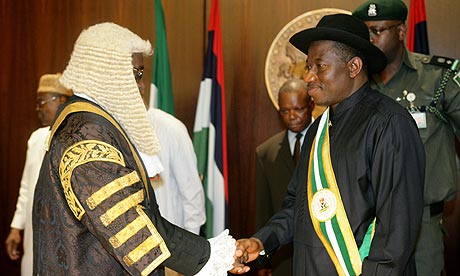
Photo courtesy of
The Daily Enquirer After a long struggle with heart and kidney problems, Nigerian president Umaru Yar'Adua passed away on Wednesday night at the age of 58. A May 5th article on by
The New York Times describes the complex legacy he will leave behind. Yar'Adua's presidency got a controversial start with accusations of ballot-box stuffing and fraud, most of which are believed to be true. At the start of his presidency, Yar'Adua promised to end the rampant violence that hampered oil production in the Niger Delta, control corruption and fix the persistent power outtages in the country. However, Yar'Adua was not able to deliver on these promises; groups such as MEND still wreak havoc in the Niger Delta (although overall violence in the area has decreased), Nigeria's premier anti-corruption leader, Nuhu Ribadu, left the country after receiving death threats for cracking down on some of Yar'Adua's supporters and electricity still goes out at frequent intervals. But it cannot be forgotten that the transition from Presidents Obasanjo to Yar'Adua marked the first peaceful transfer of power in Nigeria since gaining its independence.
Yar'Adua's presidency and death brings up two very crucial questions for Nigeria. First and foremost, Nigeria's flawed democracy was both bolstered and hurt by Yar'Adua's presidency. While it is apparent that corruption will take years and years to leave the country in multiple facets of its society, the peaceful power transfer from Presidents Obasanjo to Yar'Adua and relatively peaceful power "transfer" from Yar'Adua to Jonathan are both signs that prove democracy may not be impossible. Second, because Yar'Adua, a Muslim, passed away with about a year left in his term and his Christian vice-president Goodluck Jonathan took office, there is significant debate over how to handle this so that the balance of each religion in power is maintained. For a country so divided on religious and ethnic cleavages, this issue is critical. In addition, because the Nigerian government has low legitimacy and little faith in the rule of law, implementing any changes in the country may result in violence and sharp disagreement. These issues cannot be easily resolved and require much thought and compromise, but any decisions made will most definitely have a significant impact on Nigeria's government and politics.
Grade this post.
 According to the BBC Post "Death of Nigerian Leader exposes 'sham' Democracy" made on Monday, May 10th, Yar'Adua's death, though very tragic, actually has the potential to bring great good to Nigeria. Yar'Adua's Death has given Goodluck Jonathan a lot of power, more than he even had while Acting President, and many feel that he is likely to run for Presidency during the next election period, contrary to PDP doctrine of Switching th presidency every 8 years. This has a lot of popular approval from different areas, because the people don't feel that the region a person comes from is secondary to the ability of that person to deal with economic issues.
According to the BBC Post "Death of Nigerian Leader exposes 'sham' Democracy" made on Monday, May 10th, Yar'Adua's death, though very tragic, actually has the potential to bring great good to Nigeria. Yar'Adua's Death has given Goodluck Jonathan a lot of power, more than he even had while Acting President, and many feel that he is likely to run for Presidency during the next election period, contrary to PDP doctrine of Switching th presidency every 8 years. This has a lot of popular approval from different areas, because the people don't feel that the region a person comes from is secondary to the ability of that person to deal with economic issues.







